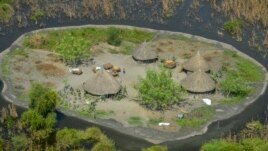22 May 2022
The people of South Sudan are debating whether to restart a project first considered over 100 years ago to change the way water moves through the country.
The Jonglei Canal project was first studied in 1904. It would move water from the Sudd wetlands in South Sudan and send it down the Nile River to Sudan and Egypt. The project started in the 1950s. Work went on for 30 years, but it was never finished. By then about 270 of a total 340 kilometers had been dug.
John Akec is a leader at the University of Juba. He started a campaign called "Save the Sudd" because he believes the canal will cause a serious problem for South Sudan.

FILE - Thatched huts surrounded by floodwaters are seen from the air in Old Fangak county in Jonglei state, South Sudan on Nov. 27, 2020. The people of South Sudan are debating whether to restart the canal project. (AP Photo/Maura Ajak, File)
If the wetlands dry, he said, "all the livelihoods" connected to that area will be lost. He started collecting signatures on a document called a petition that he will send to the nation's president. It calls for an end to the canal plan. If he gets 100,000 signatures, he will send it in. So far he has many thousands.
"Water is more valuable than oil, diamonds, gold," he said.
While some, like Akec, say the project would hurt the wetlands, others say the flooding is causing a greater problem.
Earlier this year, one of South Sudan's vice presidents – Taban Deng Gai – called to restart the canal project because of increased flooding. People who live in Jonglei and Unity states say they have not been able to raise animals and maintain their farmland.
Martha Achol is a farmer and mother of six. She said, "there is water everywhere" and the floods "have destroyed our farms." She said she never used to worry about food, but she does now. Mayak Deng is another farmer. He said the same thing. "Today, we don't have enough," he said.
Manawa Peter Gatkuoth is South Sudan's water minister. He added that the canal would permit more visitors and new transport opportunities in the area.
But environmentalists like Deng Majok Chol worry that the project will hurt the ecosystem of the wetlands. Majok Chol, who is working on an advanced environmental degree at Oxford University, said the current flooding is only a small change within the long history of the area.
He fears that removing water from the wetlands will reduce the amount of rainfall and affect people in South Sudan as well as people downstream in Sudan and Egypt.
Nhial Tiitmamer is the director of an environmental program at the Sudd Institute. Tiitmamer said the wetlands are worth $1 billion to South Sudan each year.
"This will be lost if the wetlands are drained," he said.
I'm Dan Friedell.
Dan Friedell adapted this story for VOA Learning English based on reporting by the Associated Press.
Write to us in the Comments Section and visit 51VOA.COM.
____________________________________________________
Words in This Story
canal– n. a long, narrow waterway created by people so boats can pass or water can move to supply fields
livelihood – n. a way of earning money in order to live
petition- n. a written document that people sign so they can show they want a person or organization to change something
ecosystem– n. everything that exists in an environment
drain- v. to remove water from something or a place